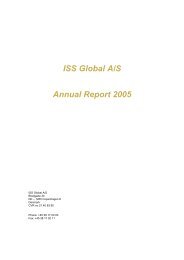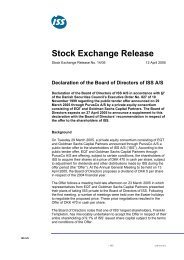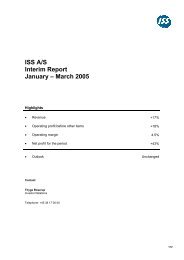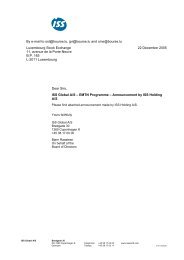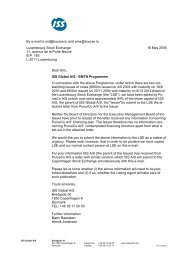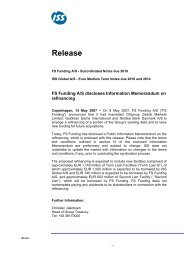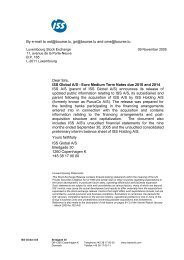Annual Report 2006 ISS Global A/S
Annual Report 2006 ISS Global A/S
Annual Report 2006 ISS Global A/S
You also want an ePaper? Increase the reach of your titles
YUMPU automatically turns print PDFs into web optimized ePapers that Google loves.
Risk Factors<br />
<strong>ISS</strong> <strong>Global</strong> is a fully owned subsidiary of <strong>ISS</strong> A/S (“<strong>ISS</strong>” or the “Group”) and is therefore affected by the same risk<br />
factors as <strong>ISS</strong>. The following section describes the risk factors identified by <strong>ISS</strong>.<br />
The description of risk factors set out below relates to <strong>ISS</strong> A/S, its operating subsidiaries and its parents FS Funding<br />
A/S (“FS Funding”) and FS Equity A/S (“FS Equity”), together referred to as “<strong>ISS</strong>” or the “Group”. The Group<br />
strives to counter and reduce the risks, which the Group is able to impact. However, <strong>ISS</strong> wishes to emphasise<br />
that any investment in securities will be subject to risk. Such factors as developments in the financial markets, in<br />
the Group’s operating performance etc. could cause an investment to be loss making. An investor could lose all or<br />
part of his or her investment. In addition to the financial market risk, <strong>ISS</strong>’s risk profile reflects both the Group’s<br />
day-to-day operations and its continued expansion. Other stakeholders having relations with <strong>ISS</strong> should also consider<br />
that the risks of <strong>ISS</strong> could adversely impact their interests. Some of the risk factors, which may adversely affect<br />
the Group’s future growth, activities, financial position and results, are described below. This is not an exhaustive<br />
description of the risk factors to which the Group or an investment in <strong>ISS</strong>’s securities is subject, nor are<br />
they listed in any order of priority.<br />
Demand for <strong>ISS</strong>’s services is subject to changes<br />
in economic conditions in its markets, as well as<br />
outsourcing trends and other factors beyond<br />
<strong>ISS</strong>’s control<br />
<strong>ISS</strong> believes that the potential growth in demand for<br />
its services generally correlates with economic conditions,<br />
including growth in gross domestic product,<br />
in the countries in which it operates. Although the<br />
Facility Services industry is normally considered to<br />
be less sensitive to economic cycles than a number<br />
of other industries, macroeconomic cyclicality – both<br />
weak and strong economic activity – presents a<br />
challenge for <strong>ISS</strong>. Periods of recession or deflation<br />
may have an adverse impact on prices and on the<br />
demand for services, particularly if customers<br />
downsize their businesses or reduce their demand<br />
for services. If <strong>ISS</strong> is not able to reduce its costs in<br />
line with price declines, then its margins will be reduced.<br />
In addition, in periods of rapid economic growth, <strong>ISS</strong><br />
may encounter problems in recruiting qualified employees<br />
or generally experience increasing staff<br />
costs. Although <strong>ISS</strong> generally seeks to include inflation<br />
adjustment clauses in its contracts in order to<br />
pass on wage increases to its customers, it may not<br />
be able to effectively pass on these increases or<br />
manage its costs, in which case its margins would<br />
be reduced. As a result of these factors, fluctuations<br />
in economic conditions may have a material adverse<br />
effect on <strong>ISS</strong>’s business, results of operations<br />
and financial condition.<br />
In addition, growth in demand for Facility Services is<br />
also influenced by general outsourcing trends. The<br />
development of outsourced Facility Services is expected<br />
to be more volatile than the Facility Services<br />
market as a whole as outsourced Facility Services<br />
may be affected by political decisions, public opinion,<br />
positive and negative experiences with outsourcing,<br />
demand by public institutions and individual<br />
users, as well as media coverage of isolated<br />
ANNUAL REPORT <strong>2006</strong> / Risk Factors<br />
events. These factors may dampen growth in outsourcing,<br />
cause contracts to be discontinued or reduce<br />
<strong>ISS</strong>’s ability to achieve satisfactory growth<br />
rates in the future.<br />
<strong>ISS</strong>’s business is subject to governmental regulation,<br />
which may constrain its operations, and<br />
its compliance costs may increase in the future<br />
<strong>ISS</strong>’s operations are subject to a variety of laws and<br />
regulations. In particular, because of <strong>ISS</strong>’s large<br />
work force, laws and regulations relating to labour,<br />
employment and immigration affect <strong>ISS</strong>’s operations.<br />
<strong>ISS</strong>’s failure to comply with applicable regulations<br />
could result in substantial fines, claims relating<br />
to violations of social and working environment legislation<br />
or revocation of licenses. In addition,<br />
changes in such laws and regulations may constrain<br />
<strong>ISS</strong>’s ability to provide services to customers or increase<br />
the costs of providing such services. For instance,<br />
under certain circumstances current EU law<br />
allows <strong>ISS</strong>, in the event that it loses a customer contract,<br />
to transfer employees working under the contract<br />
to the new provider of the services, and any restriction<br />
on <strong>ISS</strong>’s ability to transfer employees under<br />
such circumstances could substantially increase<br />
<strong>ISS</strong>’s employment costs and restrict its operational<br />
flexibility. Changes which result in Facility Services<br />
companies employing a greater proportion of workers<br />
from traditionally lower wage countries could reduce<br />
prices for Facility Services and negatively affect<br />
<strong>ISS</strong>’s results. In addition, changes in tax legislation<br />
may cause <strong>ISS</strong> to incur higher costs or reduce<br />
<strong>ISS</strong>’s competitiveness relative to in-house service<br />
providers. For example, tax regulations in certain<br />
countries may discourage the outsourcing of Facility<br />
Services. In some countries, tax laws are structured<br />
such that if entities in certain sectors outsource their<br />
Facility Services, they cannot deduct value added<br />
tax, or VAT.<br />
In first quarter 2007, the Danish Minister for Taxation<br />
has published a draft bill for public hearing. The<br />
21



